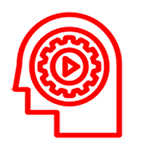What Are 7 Psychology Types?
Table of Contents
ToggleIntroduction
Psychology, the scientific study of the mind and behavior, spans a wide array of disciplines, each with a specific focus and methodology. These types of psychology help us understand various aspects of human behavior, emotions, and mental processes.
In this article, I will walk you through seven major types of psychology and their applications in everyday life.
1. Clinical Psychology
Clinical psychology is perhaps the most well-known branch, focusing on diagnosing and treating mental, emotional, and behavioral disorders. Clinical psychologists work with individuals suffering from conditions such as depression, anxiety, or schizophrenia.
They use a combination of therapies, such as cognitive-behavioral therapy (CBT), to improve patients’ mental health.
2. Cognitive Psychology
Cognitive psychology explores internal processes like thinking, memory, perception, problem-solving, and decision-making. This field helps researchers understand how people process information and is widely applied in areas like education, artificial intelligence, and therapy.
3. Developmental Psychology
Developmental psychology examines how people grow and change throughout their lives, from infancy to old age. It focuses on physical, emotional, cognitive, and social development. This type is particularly relevant in education, parenting, and healthcare.
4. Social Psychology
Social Psychology
Social psychology investigates how individuals’ thoughts, feelings, and behaviors are influenced by the presence of others. It covers topics such as group dynamics, interpersonal relationships, and societal norms.
Social psychologists often work in areas like marketing, organizational development, and public policy.
5. Industrial-Organizational Psychology
Industrial-organizational (I/O) psychology applies psychological principles to workplace environments. It focuses on improving employee performance, job satisfaction, and organizational structure. I/O psychologists frequently work with companies to enhance productivity and employee well-being.
6. Forensic Psychology
Forensic psychology combines psychology and the legal system. Forensic psychologists assist in criminal investigations, provide expert testimony in court, and assess the mental state of defendants.
This field plays a critical role in understanding criminal behavior and improving the justice system.
7. Health Psychology
Health psychology emphasizes the psychological aspects of health and illness. It examines how psychological, biological, and social factors affect health behaviors.
Health psychologists work to promote healthier lifestyles, manage chronic diseases, and support patients coping with illness.
FAQs For What Are 7 Psychology Types?
Q1: What is the most popular type of psychology?
A: Clinical psychology is one of the most popular and widely practiced branches due to its focus on mental health diagnosis and treatment.
Q2: How do I decide which type of psychology to study?
A: Your choice depends on your interests. If you’re fascinated by how the mind works, cognitive psychology might appeal to you. If you want to help people in therapy settings, clinical psychology could be a good fit.
Q3: What is the difference between clinical and counselling psychology?
A: Clinical psychology often focuses on diagnosing and treating severe mental disorders, while counselling psychology addresses general life stressors and personal development.
Q4: Can one psychologist specialize in multiple types?
A: Yes, many psychologists combine specialities, such as a clinical psychologist who incorporates cognitive psychology techniques in therapy.
Q5: Is forensic psychology only about criminal cases?
A: No, forensic psychology also involves family law cases, custody disputes, and civil litigation, alongside criminal investigations.
Q6: How does social psychology differ from sociology?
A: Social psychology focuses on individual behaviors in social contexts, while sociology examines larger social structures and group dynamics.
Q7: Are there emerging fields in psychology?
A: Yes, emerging fields like neuropsychology, environmental psychology, and cyberpsychology are gaining prominence as they address new challenges in the modern world.
Conclusion
Psychology’s seven types provide valuable insights into human behaviour and mental processes, each addressing different aspects of life.
From mental health to workplace dynamics, these branches shape how we understand and improve the world around us. Exploring them offers a deeper appreciation of the human mind and its endless complexity.


